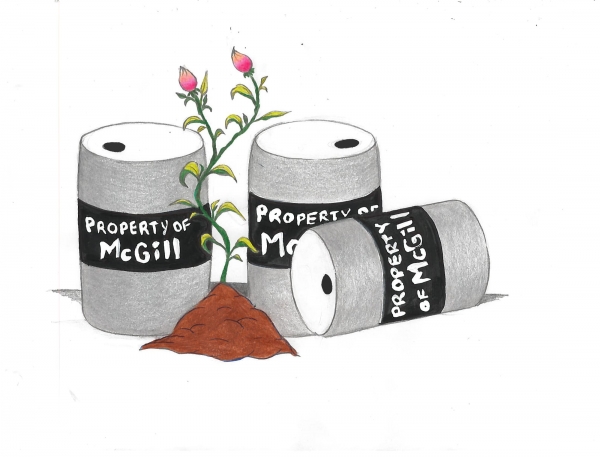Content warning: Human trafficking
Nearly 350 students across Canada and the United States attended a virtual student-led rally on March 5 to call for the defunding of Line 3, a tar sands pipeline project set to run from Alberta to Minnesota. The featured keynote speaker Tara Houska, a tribal attorney, Indigenous rights activist, and Couchiching First Nation citizen, along with other student speakers from across North America, called for universities to divest from the project and for students to take action against the pipeline. During the rally, representatives from Divest McGill provided resources for McGill-specific student action.
The Line 3 project is managed by Enbridge Inc., an energy company based in Alberta. Stine Myrah, a student from the University of Minnesota Duluth, detailed the pipeline’s impact on Indigenous peoples and climate change.
“Line 3 harms people, particularly the Anishinaabe people whose land the pipeline is being constructed through,” Myrah said. “[The pipeline’s construction] violates treaty rights and ignores Indigenous sovereignty by threatening their lands, food, cultural resources, and traditional ways of life. Pipeline construction is also directly correlated with increased human trafficking in neighbouring communities, particularly impacting Indigenous women, girls, and relatives.”
Myrah also argued that Enbridge showed a lack of accountability surrounding the sex trafficking that the pipeline has instigated.
“Enbridge and state regulators are aware of this direct link between Line 3 construction and human trafficking, but they don’t care,” Myrah said. “They do not value human well-being or human life.”
The Line 3 pipeline will require 227 surface water crossings in Minnesota. Myrah noted that Enbridge has a track record of oil spills, having been the culprit of the largest ever oil spill in the state in 1991.
During the rally, attendees were invited to sign petitions and participate in calendar jams, which involves spamming bank CEOs with calendar invites to pressure their divestment from the project. Divest McGill also called on McGill students to sign its petition supporting the boycott of Metro Inc. The boycott aims to put pressure on Maryse Bertrand—Vice-Chair of McGill’s Board of Governors (BoG) and a key member refusing for the university to divest from fossil fuels—by targeting her personal investments in Metro Inc.
Houska highlighted the importance of divestment from industries complicit in abuses of Indigenous people and exploitation of the land.
“Divestment […] is a very effective thing,” Houska said. “Morality is just not something that the banking industry, the tar sands industry, the big oil industry, the mining industries are really interested in [….] They are the destroyers of the planet, the destroyers of life.”
Houska claims that universities cannot truly be committed to inclusivity if they are investing in unethical companies.
“[It is important to bring] these arguments forward to your colleges and your universities, especially [in] places that are really proud of their social justice programming,” Houska said. “[Universities are] always bragging about their ‘space that is inclusive of all’ [….] Well, why are you a space that is investing in the destruction of Indigenous peoples’ homelands? Why are you a space that is investing in the destruction and theft from my future [and] our futures?”
In an email interview with The McGill Tribune, Zahur Ashrafuzzaman, U1 Arts & Science and Divest McGill representative, detailed McGill’s investments in the project and called on students to take direct action.
“We know about the impacts of these extractive projects on climate as well as their effects on missing and murdered Indigenous women, girls, and two-spirit people,” Ashrafuzzaman wrote. “McGill must end its complicity in this violence by ending their investments in [the] extractive industry. Beyond that, we can all commit not to bank with the big banks that are funding these projects.”









